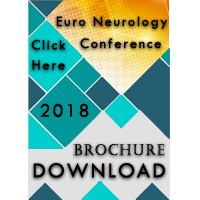
Aurelian Anghelescu
Carol Davila University of Medicine and Pharmacy, Romania
Title: Systemic inflammatory reaction induced by laborious tattooing maneuvers, unedited precipitating factor for an asymmetric, bilateral thalamo-mesencephalic infarction, in a chronically cannabis and tobacco abuser, with anatomic variant of posterior cerebral vasculature – case report and literature review
Biography
Biography: Aurelian Anghelescu
Abstract
Introduction: Cannabis is one of the most commonly used recreational illicit drugs worldwide, incriminated as risk factor for severe cardio-cerebrovascular events.
Case Report: We report an unedited, challenging clinical and physio-pathological situation of cannabis-related stroke in a 31-year-old man, with multiple lifestyle risk factors (co-occurrence of chronic marihuana abuse and tobacco smoking), associating a particular cerebrovascular condition (a silent anatomical variant of the posterior cerebral artery). He suffered a simultaneous mesencephalic and bilateral thalamus ischemic stroke, clinically manifested as a paramedian midbrain alternate syndrome, rapidly progressing to comatose state. Neither prothrombotic state nor cardiac source of embolism was found. The cerebrovascular event was triggered by a local and generalized inflammatory reaction, with chills and subfebrility, secondary to laborious and extensive tattooing maneuvers, using ink purchased on internet, kept in unsterile conditions. After the acute episode, rehabilitation program led to significant improved of the neurologic deficits and a favorable outcome, with no cardiovascular recurrence after abstinence.
Discussion: Neither entity chronic marijuana abuse and tobacco smoking nor cannabis-related stroke in a young man represent a clinical novelty. This case report might be interesting due to the unedited precipitating condition “inflammation triggered by inappropriate tattooing” and the physiopathological circumstances that synergistically cumulated and induced the severe cerebrovascular event. Faced to the spreading cannabis legalization across the world, medical community (general physicians, neurologists, cardiologists) and decision factors in education must implement sustained health interventions (in schools, universities, mass-media) underling the potentially lethal risk, incidence of stroke and severe disability, associated with this substance of abuse.

